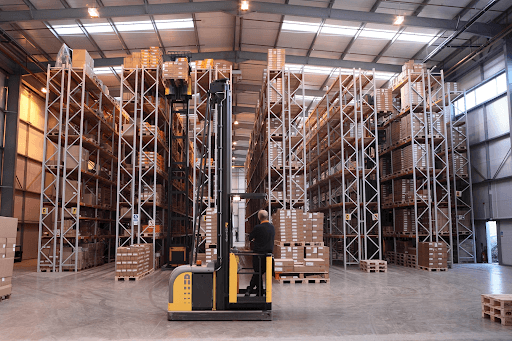Pallet racking systems are pivotal in the logistics and warehousing sector, serving as the backbone for space optimization and effective inventory management. These sturdy structures not only enhance storage efficiency but also play a critical role in ensuring the safety of both goods and personnel. To fully leverage the benefits of pallet racking, it’s essential to adhere to best practices. Here are five expert tips from EngineeredSolutionsDirect.com, a leader in warehouse storage solutions, to maximize both efficiency and safety when using pallet racking systems.
Table of Contents
Establishing a Solid Foundation: Professional Installation and Maintenance
The foundation of an effective pallet racking system lies in its proper installation and ongoing maintenance. According to EngineeredSolutionsDirect.com, who offer excellent warehouse storage solutions even the strongest racking can become hazardous if improperly installed or neglected. Here’s how to ensure a solid foundation:
Professional Installation
Hiring skilled professionals to install pallet racking systems is crucial. Expert installation ensures that the structure is built correctly and adheres to all safety standards, reducing the risk of future issues.
Regular Inspections
Routine inspections are essential to identify any damage or wear and tear. Key components such as uprights, beams, and braces should be checked regularly for signs of deformation, rust, or deterioration.
Immediate Repairs
Promptly addressing any issues found during inspections is vital. Damaged components should be repaired or replaced immediately to prevent further structural problems and ensure the system’s longevity.
Regular maintenance not only extends the lifespan of pallet racking systems but also minimizes the risk of accidents, thereby protecting both personnel and inventory.
Optimizing Loading Practices for Enhanced Efficiency
Efficient loading practices are fundamental to maximizing storage capacity and ensuring the safety and stability of pallet racking systems. Consider these strategies:
Even Weight Distribution
Distributing weight evenly across pallets and shelves is crucial to prevent overloading and potential collapses. Heavy items should be placed on lower shelves to maintain stability.
Safety Features
Incorporate safety accessories such as pallet supports, column guards, and rack protectors to reinforce the structure and prevent damage from forklift collisions or accidental impacts.
Training Personnel
Training warehouse staff on proper loading techniques, weight limits, and safety protocols is essential. Knowledgeable employees are better equipped to follow loading guidelines and identify potential hazards.
By enhancing loading practices, you can improve storage efficiency and reduce the likelihood of accidents or structural failures.
Leveraging Technology for Superior Management
Incorporating technological advancements can significantly enhance the management and operation of pallet racking systems. Explore these technological solutions:
Warehouse Management Systems (WMS)
WMS software streamlines inventory tracking, optimizes storage, and enhances order fulfillment. These systems provide real-time inventory visibility, enabling proactive decision-making and reducing the risk of overstocking or stockouts.
IoT-Enabled Monitoring
IoT sensors can monitor environmental conditions such as temperature, humidity, and structural integrity. These sensors offer actionable insights, allowing for timely interventions if issues arise.
Data Analytics
Data analytics helps identify patterns and areas for improvement. Analyzing historical data on pallet movement, inventory turnover, and operational efficiency can aid in optimizing layout design, workflows, and resource allocation.
Adopting technology-driven solutions can improve operational efficiency, enhance safety standards, and foster continuous improvement in pallet racking systems.
Mastering Inventory Management
Effective inventory management is key to maximizing the benefits of pallet racking systems. Implement these practices:
Regular Inventory Audits
Periodic audits help maintain accurate inventory records and quickly identify discrepancies, ensuring the reliability of inventory data.
Barcode or RFID Technology
Utilize barcode or RFID technology for efficient tracking and management of inventory items, enhancing accuracy and reducing manual errors.
FIFO and LIFO Systems
Applying First-In-First-Out or Last-In-First-Out systems ensures proper stock rotation, minimizes waste, and improves inventory turnover.
Effective inventory management optimizes space utilization and ensures the timely movement of goods within the warehouse.
Prioritizing Safety: Educating Employees on Protocols
Training warehouse staff is crucial for maintaining a safe working environment. Implement these safety protocols:
Forklift Safety Training
Comprehensive training on forklift operation and safety procedures reduces accident risks and enhances operational safety.
Emergency Procedures
Ensure all employees are familiar with emergency protocols, including evacuation routes and procedures for handling spills or accidents.
Personal Protective Equipment (PPE)
Equip staff with appropriate PPE, such as safety vests and helmets, to minimize injury risks and enhance overall safety.
Focusing on employee safety and providing adequate training helps create a safer working environment and reduces the risk of warehouse accidents.
By ensuring proper installation and maintenance, optimizing loading practices, embracing technology, implementing effective inventory management, and prioritizing employee safety, businesses can fully unlock the potential of pallet racking systems. These practices not only enhance operational efficiency but also safeguard personnel and assets, making pallet racking an invaluable component of modern warehouse storage solutions.

